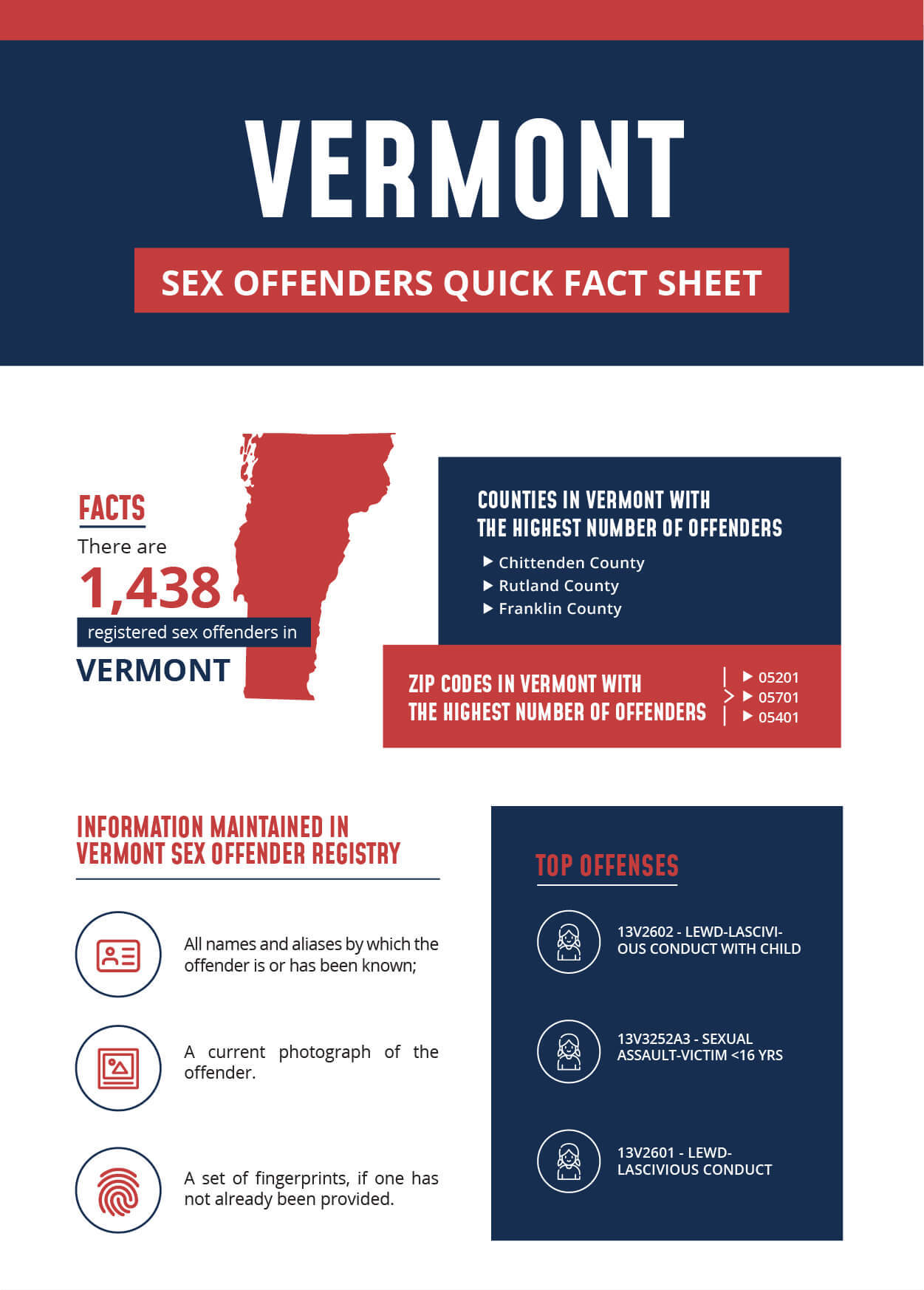Vermont’s sex offender law took effect on July 1, 1996. The law protects residents of Vermont by ensuring that persons convicted of a sex offense register in the state. The law applies to sex offenders convicted in the state on or after July 1, 1996.
According to the law, a sex offender who stays in Vermont for 10 straight days now lives in the state. The offender will have to register in the state if convicted in another state on or after July 1, 1995.
Sex offenders with the intent of living, attending school, or working in Vermont must register in the state.
Sex offenders in Vermont must report any change to the registered information within 24 hours.
A sex offender registered in Vermont but who wishes to move to another state must inform the VCIC about his/her plans. Such an offender must submit their new address to the Vermont Crime Information Center (VCIC). He/she must also register with the Sex Offender Register of the new state within 3 days of relocation.
Identify Nearby Sex Offenders in Vermont ⮕
Vermont Sex Offender Registry
Vermont’s Sex Offender Registry is in charge of all information about registered sex offenders in the state. The registry updates and stores this information in their database. Residents of Vermont can access this information from the registry’s official website.
How Well do You Know the People in Your Child's Life?
Get a Background Report in minutes.
Vermont Sex Offender Infographic

Learn and share vital facts and figures about Vermont sex offenders with this convenient infographic.
View Vermont Sexual Predator Infographic
Vermont Sex Offender Facts
Facts
- There are 1,415 registered sex offenders in Vermont as of 12/13/2021 per Klass Kids.
Top Offenses
- 13V2602 - LEWD-LASCIVIOUS CONDUCT WITH CHILD
- 13V3252A3 - SEXUAL ASSAULT-VICTIM <16 YRS
- 13V2601 - LEWD-LASCIVIOUS CONDUCT
- 13V2827 - POSSESSION OF CHILD PORNOGRAPHY
- 13V3252C - SEXUAL ASSAULT-VICTIM <16 YRS
Counties in Vermont with the highest number of offenders:
- Chittenden County
- Rutland County
- Franklin County
- Bennington County
- Windsor County
Zip Codes in Vermont with the highest number of offenders:
Nearby States:
Vermont Sex Crimes Requiring Offender Registration
- Sexual assault - VT. STAT. ANN. tit. 13, § 3252.
- Aggravated sexual assault - VT. STAT. ANN. tit. 13, § 3253.
- Lewd and lascivious behavior - VT. STAT. ANN. tit. 13, § 2601.
- Sexual abuse of a vulnerable adult - VT. STAT. ANN. tit. 13, § 1379.
- Voyeurism (2nd or subsequent convictions) - VT. STAT. ANN. tit. 13, § 2638(b).
- The attempt to commit any of the above-listed offenses.
A person who is convicted of any of the following offenses against a victim who is a minor, except that, for purposes of this subdivision, conduct which is criminal only because of the age of the victim shall not be considered an offense for purposes of the registry if the perpetrator is under the age of 18:
- Sexual assault - VT. STAT. ANN. tit. 13, § 3252.
- Aggravated sexual assault - VT. STAT. ANN. tit. 13, § 3253.
- Lewd and lascivious behavior - VT. STAT. ANN. tit. 13, § 2601.
- Sexual abuse of a vulnerable adult - VT. STAT. ANN. tit. 13, § 1379.
- Voyeurism (2nd or subsequent convictions) - VT. STAT. ANN. tit. 13, § 2638(b).
- Kidnapping - VT. STAT. ANN. tit. 13, § 2405.
- Lewd and lascivious behavior with a child - VT. STAT. ANN. tit. 13, § 2602
- White slave traffic - VT. STAT. ANN. tit. 13, § 2635.
- Sexual exploitation of children - VT. STAT. ANN. tit. 13, §§ 2821-2828.
- Procurement or solicitation - VT. STAT. ANN. tit.13, § 2632.
- The attempt to commit any of the above-listed offenses.
- A person who takes up residence in Vermont, other than within a correctional facility, and who has been convicted in any jurisdiction of the United States for a sex crime, the elements of which would constitute an offense listed in (1) or (2) above if committed in Vermont.
- A nonresident sex offender who crosses into Vermont and who is employed carries on a vocation or is a Student.
Information Maintained in Vermont Sex Offender Registry
13 V.S.A. § 5403
(a) Upon conviction and before sentencing, the court shall order the sex offender to provide the court with the following information, which the court shall forward to the department forthwith:
- name;
- date of birth;
- general physical description;
- current address;
- Social Security number;
- fingerprints;
- current photograph;
- current employment; and
- name and address of any postsecondary educational institution at which the sex offender is enrolled as a student.
Community Notification and Websites
13 V.S.A. § 5411a
(b) The Department shall electronically post the following information on sex offenders designated in subsection (a) of this section:
(1) the offender's name and any known aliases;
(2) the offender's date of birth;
(3) a general physical description of the offender;
(4) a digital photograph of the offender;
(5) the offender's town of residence;
(6) the date and nature of the offender's conviction;
(7) if the offender is under the supervision of the Department of Corrections, the name and telephone number of the local Department of Corrections office in charge of monitoring the sex offender;
(8) whether the offender complied with treatment recommended by the Department of Corrections;
(9) a statement that there is an outstanding warrant for the offender's arrest, if applicable;
(10) the reason for which the offender information is accessible under this section;
(11) whether the offender has been designated high risk by the Department of Corrections pursuant to section 5411b of this title; and
(12) if the offender has not been subject to a risk assessment, a statement that the offender has not been so assessed and that such a person is presumed to be high risk, provided that the Department of Corrections shall permit a person subject to this subdivision to obtain a risk assessment at the person's own expense.
(c) The Department shall have the authority to take necessary steps to obtain digital photographs of offenders whose information is required to be posted on the Internet and to update photographs as necessary. An offender shall annually report to the Department or a local law enforcement agency for the purpose of being photographed for the Internet.
(d) An offender's street address shall not be posted electronically. The identity of a victim of an offense that requires registration shall not be released.
(e) Information regarding a sex offender shall not be posted electronically if the conduct that is the basis for the offense is criminal only because of the age of the victim and the perpetrator is within 38 months of age of the victim.
(f) Information regarding a sex offender shall not be posted electronically prior to the offender reaching 18 years of age, but such information shall be otherwise available pursuant to section 5411 of this title.
(g) Information on sex offenders shall be posted on the Internet for the duration of time for which they are subject to notification requirements under section 5401 et seq. of this title.
Limitations on Residency or Employment
None
Duration of Registration
13 V.S.A. § 5407(e)-(f)
10 years for persons not subject to lifetime registration.
Life for persons:
- With at least 1 prior conviction or a registrable offense
- Convicted of sexual assault when the victim was under 14 and the offender was more than 6 years older than the victim
- Convicted of aggravated sexual assault
- Determined to be a sexually violent predator.
Timeframe for Registration
Within 10 days after establishing residence in the state, annually within 10 days after each anniversary of the person’s date of release, 3 days of changing the address
Applies to Offenders Convicted in another State?
Yes
Verification of Address
Yes, at least once a year they will receive a form letter from VCIC verifying their current address. They must complete the form and return it to VCIC within 10 days of birthday.
Penalties for Non-Compliance
For a first offense, up to 2 years imprisonment and $1,000 fine. For second and subsequent offense, by a sexually violent predator, up to 3 years imprisonment and $5,000 fine
Free Parental eBook
Kids Live Safe put together a comprehensive parents guide about sexual predators and keeping children safe.
This free online eBook includes vital statistics, how to tell if a predator is victimizing a child, and social media and cyber-bullying.
See Kids Live Safe eBook 
View Registered Sex Offenders in Your Vermont ZIP Code Below
- 05201
- 05701
- 05401
- 05301
- 05478
- 05641
- 05452
- 05819
- 05468
- 05403
- 05446
- 05156
- 05488
- 05855
- 05602
- 05001
- 05733
- 05476
- 05404
- 05663
- 05060
- 05450
- 05482
- 05743
- 05143
- 05495
- 05851
- 05753
- 05261
- 05068
- 05033
- 05443
- 05101
- 05459
- 05089
- 05679
- 05860
- 05656
- 05734
- 05489
- 05255
- 05454
- 05346
- 05262
- 05408
- 05763
- 05250
- 05764
- 05039
- 05822
- 05843
- 05760
- 05847
- 05661
- 05457
- 05773
- 05676
- 05777
- 05735
- 05655
- 05867
- 05857
- 05759
- 05257
- 05046
- 05660
- 05076
- 05343
- 05061
- 05824
- 05758
- 05765
- 05150
- 05871
- 05048
- 05081
- 05647
- 05487
- 05757
- 05766
- 05440
- 05447
- 05051
- 05866
- 05069
- 05354
- 05828
- 05151
- 05652
- 05906
- 05837
- 05672
- 05477
- 05658
- 05751
- 05086
- 05738
- 05829
- 05038
- 05836
- 05491
- 05445
- 05464
- 05455
- 05859
- 05041
- 05778
- 05458
- 05065
- 05820
- 05736
- 05032
- 05461
- 05363
- 05483
- 05853
- 05253
- 05079
- 05462
- 05846
- 05158
- 05472
- 05873
- 05905
- 05669
- 05036
- 05772
- 05155
- 05742
- 05821
- 05774
- 05448
- 05362
- 05667
- 05904
- 05682
- 05492
- 05465
- 05149
- 05830
- 05833
- 05770
- 05341
- 05052
- 05473
- 05345
- 05091
- 05874
- 05045
- 05681
- 05471
- 05035
- 05494
- 05456
- 05361
- 05077
- 05352
- 05260
- 05858
- 05775
- 05767
- 05442
- 05903
- 05444
- 05043
- 05251
- 05084
- 05841
- 05761
- 05739
- 05902
- 05673
- 05650
- 05062
- 05872
- 05083
- 05680
- 05073
- 05353
- 05154
- 05037
- 05042
- 05356
- 05845
- 05651
- 05055
- 05486
- 05850
- 05152
- 05359
- 05832
- 05148
- 05340
- 05730
- 05737
- 05040
- 05674
- 05747
- 05067
- 05056
- 05654
- 05153
- 05474
- 05875
- 05649
- 05252
- 05640
- 05907
- 05142
- 05868
- 05072
- 05732
- 05034
- 05675
- 05776
- 05146
- 05360
- 05677
- 05075
- 05842
- 05748
- 05441
- 05355
- 05827
- 05358
- 05351
- 05053
- 05862
- 05839
- 05071
- 05762
- 05463
- 05653
- 05769
- 05826
- 05141
- 05350
- 05070
- 05744
- 05342
- 05058
- 05648
- 05161
- 05666
